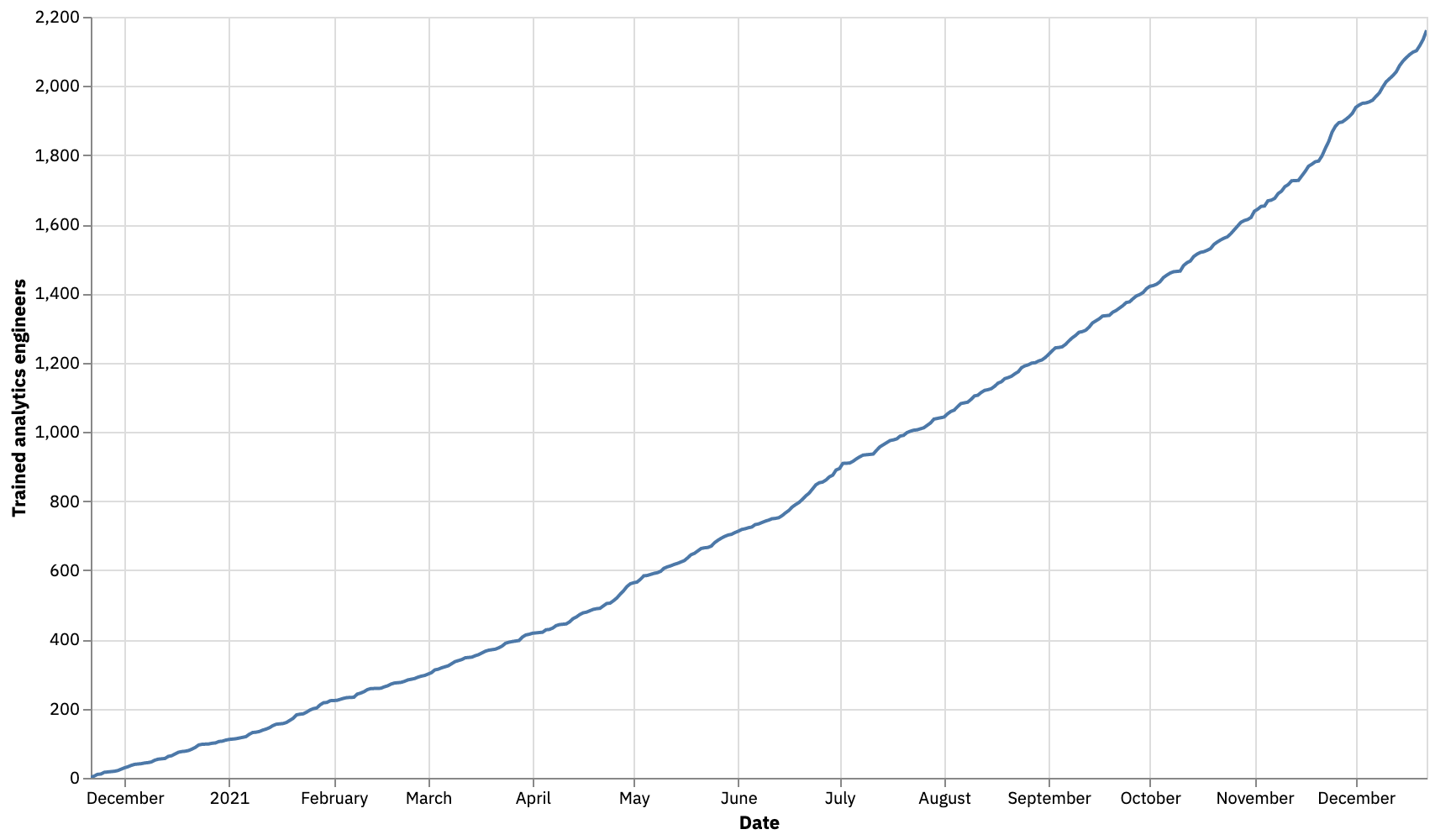NEW dbt Learn courses & badging now available!

on Dec 07, 2021
More than 2,000 analytics engineers have completed the free dbt Learn Fundamentals course, with completion numbers trending towards exponential growth in the last few months.

We're not sure if this uptick is related to the number of open roles for analytics engineers... or because word of Kyle's incredible on-screen presence has gone viral. Whatever the case, we heard loud and clear that we needed to make this content more accessible to more people.
Today, I'm happy to share that we now have five dbt Learn courses designed to get any analytics professional (current or future ✨) from dabbler to doyen:
- dbt Learn Fundamentals
- dbt Learn Macros and Packages with Jinja
- dbt Learn Advanced Materializations
- dbt Learn Analyses and Seeds
- dbt Learn Refactoring SQL for Modularity
The first four courses noted above were previously contained in one longer Fundamentals course. We've since pulled them out, and recut each for the latest dbt environment to provide more focus and flexibility.
Looking for a shorter primer on dbt philosophies and core concepts? dbt 101 is a great place to start. This session attracted more attendees than any of the other 40+ talks at Coalesce 2020, and was a top contender for 2021! Check out last year's recording, or this year's session available now on the Coalesce event website.
Already completed dbt Learn Fundamentals? Look out for an email on next steps for receiving your badge.
What to expect in each course
UPDATED: dbt Learn Fundamentals + badging
Even with an average attendee NPS of 83(!), we learned a lot from the dbt Fundamentals "v1," and are excited to announce that a shorter, sharper iteration is now live. We've also added a quiz at the end of the course, so that you can show the world (or at least your LinkedIn network) that you've mastered core concepts.
Since dbt is both a tool and a framework for reimagining how your organization works with data, completing this course should feel pretty significant! Rock that badge with pride.
What's inside:
This ~5 hour soup-to-nuts guided tutorial begins with dbt Cloud set-up* and ends with deploying your first project. You'll learn best practices for writing models and tests, meet the (actually life-changing) 'ref' function, and learn how to generate and view documentation anyone in your org can use.
This course is perfect for anyone that's interested in getting closer to the data development process, regardless of their current skills and experience (though basic SQL skills are required!).
*Not a dbt Cloud customer? No worries! This course includes instruction for setting up a free two-week dbt Cloud trial account -- more than enough time to complete your course, and start practicing a bit on your own!
dbt Learn Macros and Packages with Jinja
dbt isn't just data transformation via SQL. It's a portable, modular framework for co-developing data the whole organization can trust. Jinja, a templating language, plays a big role in making this possible -- enabling you to do things that aren't normally possible in SQL. Mastering Jinja is a force multiplier for helping your team work faster and more efficiently.
What's inside:
Included in this 2 hour course is a deep-dive on Jinja structure and application including macros (bits of code that can be reused multiple times) and packages (community and dbt labs contributed groupings of macros freely available for use in any of your projects). Turn long, repetitive code blocks into reusable, short commands. Packages also allow you to leverage models of common data sources and add more powerful tests to increase your data quality, all contributed by community members.
This course is great for individual power-users or team leads focused on creating reusable assets that drive greater team efficiency and leveraging packages to supercharge your project.
dbt Learn Materializations
Materializations are different ways dbt builds and persists your models in the data warehouse. By default, dbt models are materialized as "views," but understanding when to use the other four options -- table, incremental, ephemeral, and snapshot -- will help optimize build time, project performance, and warehouse usage. What's inside:
This 2 hour course includes a deep dive on the five different materializations offered in dbt. You'll learn how to implement each and begin developing your intuition for which is the best choice given variables like data size, frequency of changes, and predictability of updates.
dbt Learn Analyses and Seeds
Have you ever wanted to version control a query without creating a model, say for a draft model or a query you're using for QA? Or maybe you needed to create a lookup table for data that you wanted to join into your models, like country codes, quarterly revenue goals, or employee IDs. Analyses and Seeds have got your back. What's inside:
In this 1 hour course you'll learn how to create analyses and seeds, how to identify the right time to implement them, and how to incorporate them into your project.
dbt Learn Refactoring SQL for Modularity
Folks with a bit of experience in dbt will eventually want to consider migrating legacy transformation code into modular dbt data models. This is especially useful if you're porting stored procedures or SQL scripts into your dbt project!
What's inside:
This 3.5 hour intermediate course will walk you through the process of choosing a refactoring strategy, implementing sources and translating hard coded table references, grouping CTEs, centralizing logic in staging models, and auditing your final models. If we lost you anywhere in there, don't forget this course is best reserved for those that already have a bit of experience with dbt, and are looking to bring the rest of their transformations in line!
VS Code Extension
The free dbt VS Code extension is the best way to develop locally in dbt.



